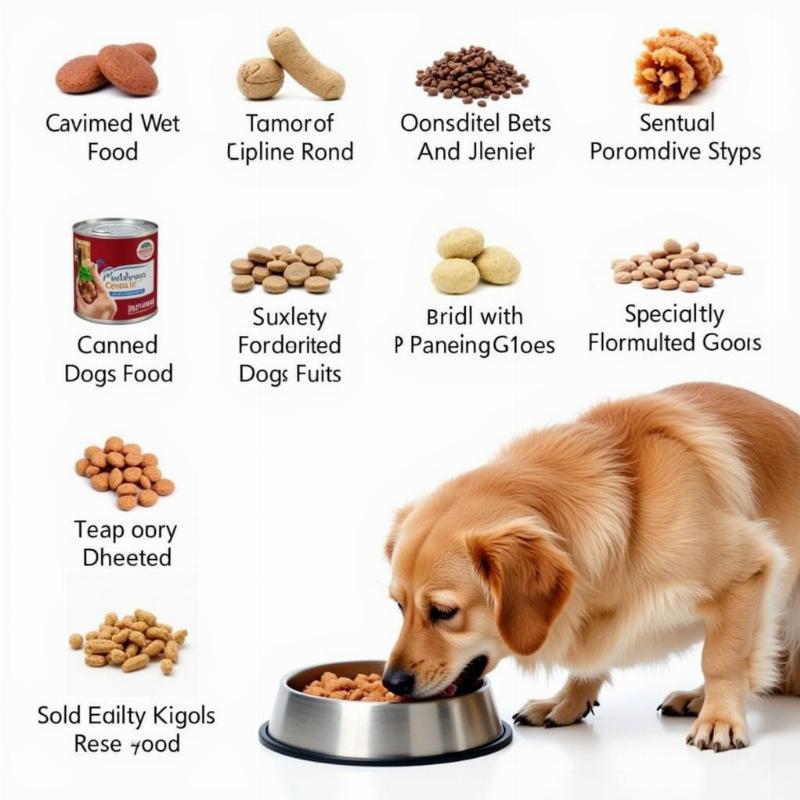Senior dogs often experience dental problems, making it difficult and painful for them to eat their regular kibble. Choosing the best food for senior dogs with bad teeth is crucial for maintaining their health and happiness. The right food can not only provide essential nutrients but also minimize discomfort and promote better oral hygiene. Let’s explore the ideal dietary options for your aging companion.
 Soft food options for senior dogs with bad teeth
Soft food options for senior dogs with bad teeth
Understanding Dental Issues in Senior Dogs
As dogs age, their teeth can wear down, become loose, or develop infections. This can lead to pain, difficulty chewing, and even loss of appetite. Choosing food that is easy to eat and digest can significantly improve your senior dog’s quality of life.
Common Dental Problems in Older Dogs
- Periodontal disease: This is the most common dental problem in dogs, causing inflammation and infection of the gums and supporting structures of the teeth. It can lead to tooth loss and even affect other organs.
- Tooth resorption: This is a painful condition where the tooth’s structure breaks down, often leading to fractures and infections.
- Gingivitis: Inflammation of the gums, often a precursor to periodontal disease.
Best Food Options for Senior Dogs with Bad Teeth
Several types of food are suitable for senior dogs with dental issues. Consider these options:
- Wet food: Canned or pouched wet food is softer and easier to chew than dry kibble. Look for formulas specifically designed for senior dogs, as they often contain added nutrients and joint support.
- Soft dry food: Some brands offer kibble that is specifically formulated to be softer and more easily chewed. These kibble pieces are often smaller and have a more porous texture.
- Soaked kibble: Soaking your dog’s regular kibble in warm water or broth can soften it, making it easier to eat. Be sure to discard any uneaten soaked kibble after a few hours to prevent bacterial growth.
- Homemade food: If you choose to make your dog’s food at home, consult with a veterinary nutritionist to ensure a balanced and complete diet. You can create soft, easily digestible meals using ingredients like cooked chicken, rice, and vegetables.
What to Look for in Senior Dog Food
When choosing food for your senior dog, consider the following:
- High-quality ingredients: Look for foods made with whole meat sources, digestible carbohydrates, and healthy fats.
- Complete and balanced nutrition: Ensure the food meets the AAFCO (Association of American Feed Control Officials) standards for senior dogs.
- Added joint support: Many senior dogs experience joint issues, so look for food with added glucosamine and chondroitin.
- Dental health benefits: Some foods contain ingredients that help reduce plaque and tartar buildup.
Feeding Tips for Senior Dogs with Bad Teeth
- Smaller, more frequent meals: This can help with digestion and reduce the strain on your dog’s teeth.
- Elevated food bowls: These can make it easier for senior dogs to eat comfortably.
- Dental treats and chews: These can help clean your dog’s teeth and freshen their breath. best dental gel for dogs
- Regular veterinary dental checkups: These are essential for maintaining your senior dog’s oral health. dog teeth cleaning los angeles
Conclusion
Choosing the right food is crucial for senior dogs with bad teeth. By selecting a soft, easily digestible diet and providing proper dental care, you can help your aging companion maintain a healthy and happy life. Remember to consult with your veterinarian to determine the best food and dental care plan for your individual dog’s needs. how often do dogs need dental cleaning
FAQ
- What can I feed a senior dog with no teeth? Soft wet food, pureed food, or specially formulated dental diets are ideal for dogs with no teeth. how to feed a dog with no teeth
- Can I give my senior dog bones if they have bad teeth? Avoid giving hard bones, as they can further damage weakened teeth. Soft, digestible chews are a better option. dental care finger wipes for dogs
- How can I encourage my senior dog to eat if they are experiencing dental pain? Warming their food, offering smaller meals, or adding a small amount of low-sodium broth can make food more appealing.
- Are there any supplements that can help with my senior dog’s dental health? Dental chews and supplements containing enzymes or probiotics may help reduce plaque and tartar.
- How often should I brush my senior dog’s teeth? Ideally, daily brushing is recommended. However, even a few times a week can make a difference.
- What are the signs of dental pain in senior dogs? Drooling, reluctance to eat, pawing at the mouth, and bad breath are common signs.
- Can dental problems affect my senior dog’s overall health? Yes, dental infections can spread to other organs and affect overall health.
Beautdogs.us is your premier resource for all things dog-related in the USA. We offer expert advice on dog breeds, care, and products, catering to both novice and experienced dog owners. We provide a wealth of information to help you navigate the world of dog ownership, from choosing the right breed to providing the best possible care. Contact us today for all your dog-related needs! Email: [email protected], Phone: +1 501-555-7529. Visit us at Beautdogs.us.